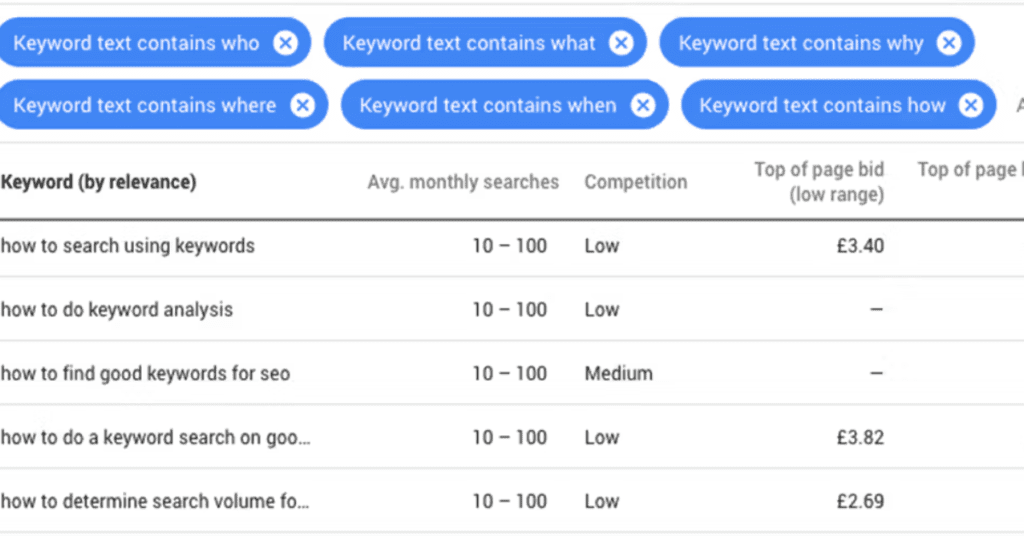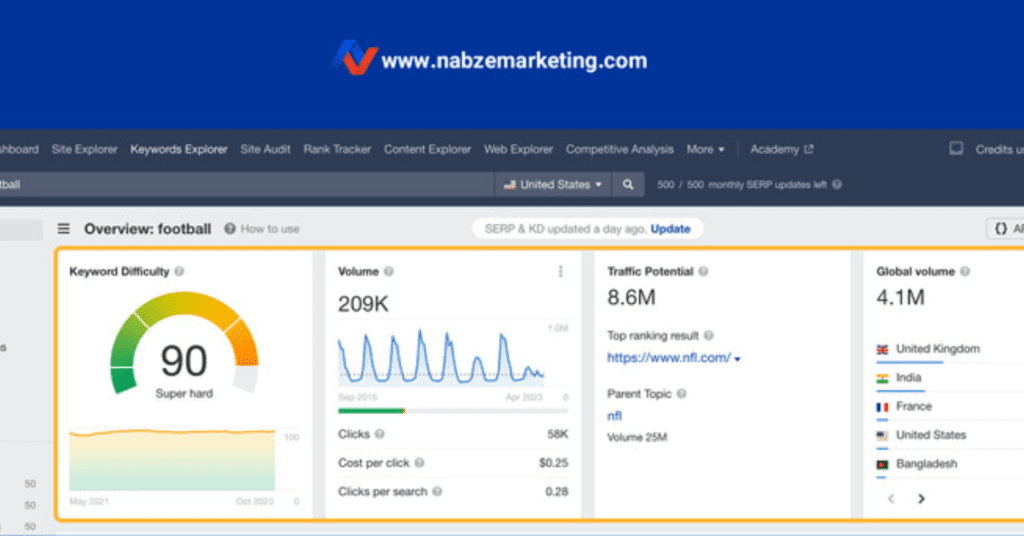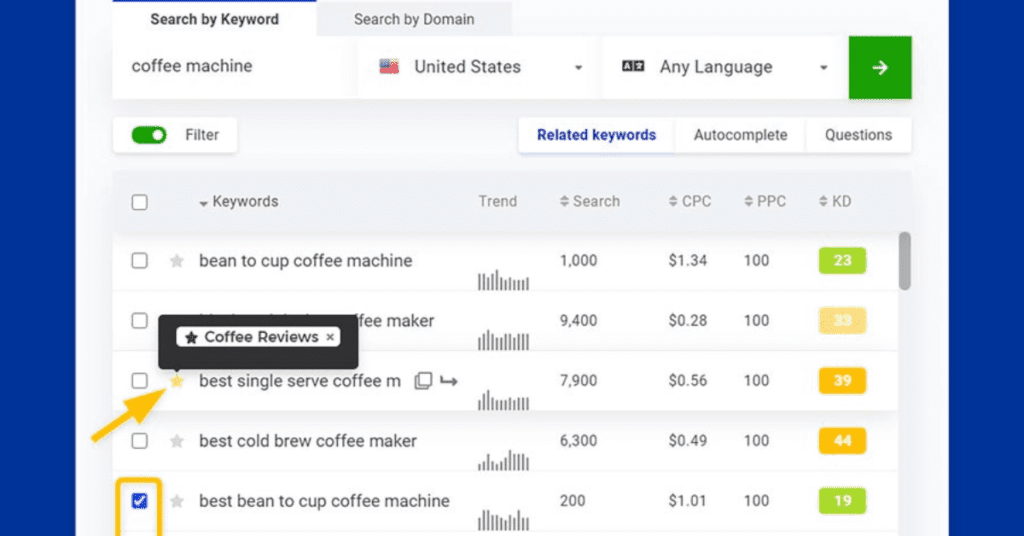The keyword research is one of the most important parts of the on-page SEO checklist. No matter how skilled you are as a marketer, knowing the right keywords to focus on can make a big difference in your success. How can you determine which buzzwords will drive traffic to your site? What makes you sure you have the right tools for the job? Discover the best tools for keyword research that will help you improve your SEO approach as we dive into the world of keyword research tools.
Why Researching Keywords Is Important for SEO
It’s crucial to understand the significance of topic study for SEO before delving into the tools. Keywords are the exact words and sentences that people type into search engines to find things. You can target your information to the most interested people by using keywords.
Conducting a thorough topic study can be beneficial.
- Figure out what your community wants: Find out what people are really looking for in your area.
- Improve the content: Use buzzwords that get a lot of traffic to form the basis of your blog posts, landing pages, and product details.
- Do better than the others: Find places where your rivals might be missing out on beneficial keywords.
- Boost natural traffic: Boost your search engine ranking and get more people to visit your website.
The Best Tools for Keyword Research
Let’s look at some of the best tools for keyword research that can help your SEO now that we know how important keyword research is. Here is a list of the best keyword research tools you can use right now, including some that are free and some that cost money.
1. Keyword Planner on Google
A lot of SEO experts, especially new ones, use Google Keyword Planner all the time. This free tool from Google Ads lets you look for term ideas, see how often people search for them, and see how the competition is doing. It’s mostly used for pay-per-click ads, but it’s also excellent for SEO.

Features:
- We generate keyword ideas based on seed terms.
- Examine the search frequency data to determine the frequency of usage of specific buzzwords.
- Find out how popular a keyword is by doing a competition study.
- Budget insights: This feature helps you figure out how much PPC ads are likely to cost.
Google Keyword Planner is pretty basic, but it’s a fantastic place to start when you’re researching keywords. It’s free of cost, so anyone can use it easily.
2. Keyword Explorer from Ahrefs
One of the best SEO tools on the market is Ahrefs, and its Keyword Explorer tool is the best for doing in-depth keyword research. It’s known for being accurate and giving a lot of information about things like search volume, keyword difficulty, and even the number of clicks that certain keywords get.

Features:
- Information about search volume: See how often people search on average each month.
- Keyword difficulty: This feature helps to find the competition of a keyword.
- Clickstream data: Find out how many times people click on certain keywords in search results.
- Keyword ideas: Using your seed terms, come up with hundreds of similar keywords.
Many other tools don’t give you as much information as Ahrefs does. This makes it perfect for experienced marketers who want to learn more about their keyword strategy.
3. The Keyword Magic Tool from SEMrush
When it comes to SEO tools, SEMrush is one of the best tools for keyword research. Its Keyword Magic Tool can find thousands of keyword ideas that are perfect for any area. It works excellently for researching both short-tail and long-tail keywords.

Features:
- Search volume: Get correct and up-to-date information on numbers.
- Keyword difficulty: Determine the ease or difficulty of ranking for specific terms.
- Search engine results pages (SERPs): Look at which SERPs show up for certain terms.
- Keyword variations: Look for words and sentences that are similar.
SEMrush is a great tool for thorough keyword research, competitive analysis, and backlink checks, but it’s more suited for those who are willing to pay for it.
4. Keyword Explorer on Moz
Moz’s Keyword Explorer tool makes researching keywords simple for everyone. It displays the volume of searches for each term, the difficulty of ranking for it, and its organic click-through rate (CTR).

Features:
- Keyword ideas: Based on your seed terms, get new keyword ideas.
- Search volume and difficulty: See how competitive a term is and how much traffic it could bring in.
- SERP analysis: Know how the competition is doing for any term.
- Priority score: This is Moz’s own unique measure that helps you rank keywords by how valuable they might be.
Because it is simple and straightforward to use, Moz Keyword Explorer is a fantastic choice for new and experienced users.
5. Just Ask Uber – Ubersuggest
The free keyword research tool Ubersuggest by Neil Patel is very famous. It’s simple to use and ideal for people who are just starting out. It has many useful features, such as keyword ideas, SEO difficulty scores, and a study of your competitors.

Features:
- Discover the monthly search volume for specific keywords.
- Generate a list of related keywords.
- SEO challenge score: See how difficult it will be to rank for each term.
- Content ideas: Find high-ranking information to help you plan your SEO approach.
You can use Ubersuggest instead of paid tools like Ahrefs or SEMrush if you want a free option for smaller SEO efforts.
6. KWFinder by Mangools
KWFinder is another keyword research tool that is easy to use. It has a clean layout and data that is simple to understand. It’s great for finding keywords with little competition that will help you rank fast.

Features:
- Keyword help: Get thorough help with keywords based on your field.
- Get accurate information about the volume of searches and the difficulty of the keywords.
- SERP analysis: Find out which companies are competing with you for certain terms.
- Location-based results: Look at terms for different places in the world.
Anyone who works in SEO can benefit from KWFinder, no matter how much experience they have or how new they are to the field. It strikes a pleasing mix between being simple to use and having a lot of features.
7. Keyword Tool
Another excellent free option is Keyword Tool, which works just like Google Keyword Planner. Search engines like Google, YouTube, Bing, Amazon, and others send it phrase ideas. The free version only has a small amount of data, but it’s still a useful way to quickly come up with keyword ideas.

Features:
- We provide keyword ideas for various sites, including Google, YouTube, Bing, Amazon, and more.
- Long-tail keyword generator: This tool is excellent for finding terms that aren’t as competitive but are still very important.
- The free version has a limited search rate, but it’s still useful for coming up with ideas.
- No account needed: Keyword Tool is available without an account, unlike other tools.
The Keyword Tool is a suitable choice if you want a quick and easy way to come up with keyword ideas.
Which Is Better for You: Free or Paid Keyword Research Tools?
There are both free and paid tools for term study. Goals, experience, and income will determine your best option.
Free Tools:
- Google Keyword Planner, Ubersuggest, and Keyword Tool are excellent for people who are just starting out or who don’t have a lot of money. Even though they don’t have as much information as paid tools, they can still help you start researching keywords.
Paid Tools:
- You should buy paid tools like Ahrefs, SEMrush, and Moz if you’re serious about SEO and need a lot of data and information. These tools offer more thorough research and are best for people who are in charge of bigger campaigns or multiple websites.
How to Get the Most Out of Keyword Research Tools
The most out of a search tool requires proper use. To get the most out of your keyword study tools, follow these tips:
- Start with Seed Keywords: Enter general terms associated with your niche or business. We will use these as a starting point to uncover additional keyword ideas.
- Look at the search volume: Focus on keywords that get a good number of searches but don’t have a lot of competition. Most of the time, these are the easiest to rank for.
- Check the Difficulty of Keywords: Make sure you’re focusing on keywords that you can actually rank for based on the influence and resources of your website.
- Think About Search Intent: Pay attention to terms that match what people are looking for, whether they’re looking for information, to make a purchase, or to find their way around.
- Look into Long-Tail Keywords: Long-tail keywords are very specific and usually don’t have as much competition, which makes them easier to rank for.
Conclusion
Doing a thorough topic study is one of the most important things you can do to improve your SEO. You can use the right tools to find the keywords that will drive traffic to your website and boost its search rankings. It’s important for SEO success to pick the right tool for the job, whether it’s Google Keyword Planner, Ahrefs, or Ubersuggest.
Remember that keyword study isn’t something you only do once. It’s an ongoing process that helps you keep up with the fast-changing world of digital.
Frequently Asked Questions
1. Which is the best free tool for keyword research?
For keyword research, Google Keyword Planner and Ubersuggest are two of the best free tools you can use.
2. How do I choose which keywords to go after?
Find keywords that get a significant number of searches but don’t have a lot of competition. A lot of the time, long-tail terms are a beneficial mix.
3. I want to improve my SEO. How can I do that?
You can make your SEO work a lot better by focusing on the right keywords, making your content better, and keeping up with search trends.
4. Are keyword tools that cost money worth it?
Yes, paid tools like Ahrefs and SEMrush give you more accurate and detailed information, so they are worth the money for real SEO efforts.
5. How often should I keep my keyword study up to date?
Trends in keywords change over time, so you should do new study every couple of months to stay up to date.
